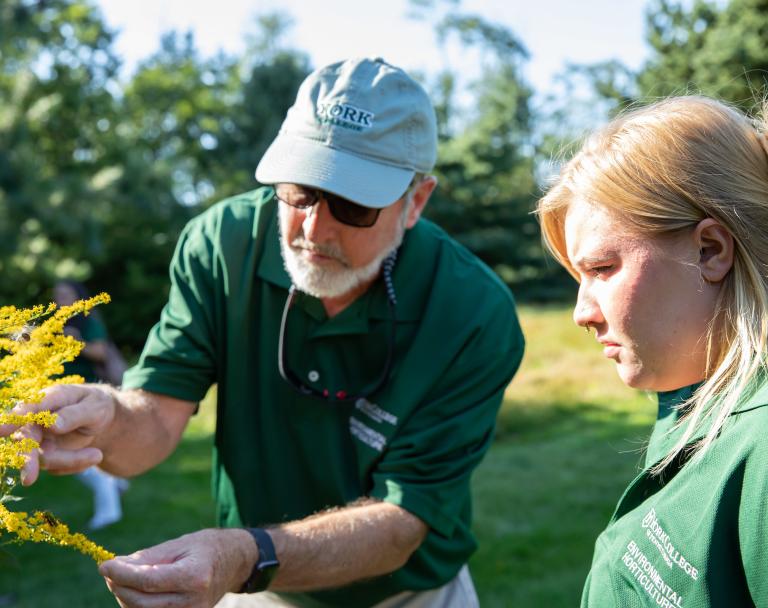
What does a horticulturist do? How do you become a horticulturist?
Horticulturists are professionals trained in the science of plant cultivation and production who work to oversee and improve the growth of quality food plants, ornamental plants, and medicinal plants.
These knowledgeable professionals are essential to growing and maintaining flowers, trees, shrubs, and crops. They work directly with seeds, soil, and plants in settings ranging from private and public gardens to plant nurseries to large-scale food, medicinal, and decorative plant-growing operations.
Horticulturists know how to help plants thrive. Through education and on-the-job training, they learn how to apply scientific knowledge to maximize plant growth and health through techniques like irrigation, plant genetics, and pest management.
Learn more about what professional horticulturists do, where they work, and how to become one.
What does a Horticulturist Do?
Horticulturists use their expertise in plant cultivation to improve the quality or yield of healthy flowers, trees, shrubs, fruit plants, vegetable plants, ivies, grasses, and turf. If you love plants, horticulture is a field with many opportunities to work for yourself or as part of a team.
Trained horticulturists protect plants in gardens, parks, and farms from diseases and pests. Their expertise is employed to protect ecosystems from degradation and waterways from harmful erosion and pollution. Horticulturists may cultivate exotic or common plants, assist with the farming of flowers and trees for commercial nurseries, and maintain private backyard oases with a highly technical eye.
Sometimes, horticulturists work with many different plants in one place, like a conservatory, commercial landscape, or public botanical garden. Horticulturists can also hone their skills to maximize the production of just one kind of plant, working on small or large commercial farms to grow that plant as efficiently as possible.
Horticulturists can specialize in plant genetics, using cross-breeding and pollination to create desired characteristics in a vegetable, fruit, or flowering plant. They can also specialize in conservation or environmental horticulture. Environmental horticulture is an increasingly in-demand field concerned with integrating green practices into the horticultural use of land, water, and chemicals.
Difference Between Horticulture and Botany
While botanists study plants in nature, horticulturists typically want to harness that knowledge to grow more or better plants for consumers. Horticulturists often work in greenhouse or nursery businesses, or in beautiful public or private gardens. Horticulturists usually deal with agricultural food or ornamental plants alone, while botanists study many different types of plants.
Think about it this way: botanists identify plants and discover their uses, while horticulturists actively grow and cultivate plants with certain characteristics for agricultural, public, or commercial purposes.
Typical Horticulturist Job Description
A horticulturist or horticultural technician job description varies for roles working outside in a farm, nursery, or garden; in a greenhouse or indoor conservatory; or in a laboratory setting. There are even jobs that require horticulturists to traverse worlds, conducting both lab and field work.
If you’re looking to become a horticulturist, expect to be responsible for tasks such as:
- Handling seeds and cuttings for propagation
- Caring for ornamental plants like hedges, flower beds, or trees
- Gathering and analyzing data to help face pests, environmental impact, or disease
- Applying chemical treatments like growth chemicals and pesticides
- Using agricultural machinery and laboratory equipment
- Designing aesthetically pleasing gardens and parks
- Planning optimized crop plant and harvest schedules
To become a horticulturist, knowledge and experience are required in plant science, crop production, soil chemistry, irrigation, fertilization, and pest and disease management. Horticulturists who can execute projects with minimal environmental impact are also increasingly valuable to employers.
The ability to handle administrative tasks and use written and verbal communication skills are also necessary to translate scientific and technical information about the health of plants to stakeholders like farmers, property owners, and growers. These professional skills also help open opportunities for managerial roles overseeing staff and executing supervisory responsibilities like scheduling.
Where do Horticulturists Work?
Plants are all around us, so it’s no surprise that horticultural work environments are many and varied.
Horticulturalists and horticultural technicians work with or for construction and landscaping companies, plant nurseries, garden maintenance businesses, public or private parks and gardens, agricultural or horticultural laboratories, and greenhouses belonging to educational institutions, commercial businesses, government agencies, or conservation organizations.
Other areas of horticulture include turf management, where individuals manage facilities such as sporting fields and golf courses. Vineyards and wineries also employ horticulturists to help develop better grape varietals or to maximize production and profit.
Throughout their career, horticulturists can pivot to work in educational or research settings, consulting and advising roles, or urban land management. Whether it’s a lush backyard oasis, ornamental museum gardens, or an urban farm serving a local food desert, the work environment for horticulturists is sure to be filled with plants and other plant lovers.
Horticulturist Salary
According to Indeed.com, in 2022, the average base annual salary for horticulturists in the United States is $48,560 per year. Salary potential can vary for horticulturists depending on their location, skill level, years of experience, and other factors. You could also increase your wage by progressing to supervisory roles, working for more prestigious gardens or larger corporations, consulting, or owning your own horticultural business.
How to Become a Horticulturist
Becoming a horticulturist is a fulfilling career path. If you demonstrate experience, the ability to work outside and handle machinery, and the ability to apply plant science knowledge to your or your client’s goals, working as a horticulturist on the grounds of governmental institutions, local municipalities, or on family-owned farms can be your future.
The following are the three steps to take to become a horticulturist:
- Graduate high school
- Earn a four-year bachelor’s degree in horticulture, plant or soil science, or a related field
- Gain on-the-job experience
Horticulture Degrees and Certifications
Post-secondary degrees and professional certifications elevate horticultural job opportunities and salary potential. Of Indeed job openings for horticulturists, over 40 percent required a bachelor’s degree level of education. While some entry-level horticultural careers can begin with a high school diploma or associate degree, bachelor’s degrees in horticulture are increasingly preferred or required by employers. In high school, make sure to take classes like biology and chemistry to prepare for post-secondary training and education.
Professional horticultural organizations and associations exist as places to network, continue your training, and gain licenses and certifications. Some certifications are necessary to handle agricultural chemicals, like the Environmental Protection Agency (EPA)’s Pesticide Applicator’s License, and some distinguish you in the job market with special skills. Become a member of professional organizations such as:
- AmericanHort
- American Society for Horticultural Science
- American Horticultural Society
- International Society for Horticultural Science
- International Society of Arboriculture
Careers Related to Horticulture
Trained horticulturists are well-versed in research, verbal and written communication, environmental issues, and scientific principles. With this wealth of knowledge, horticulturists can pursue careers in education and research, either through public outreach education or through higher education and research institutions.
Further study in psychology or occupational therapy opens careers in horticultural therapy. Horticultural therapists use gardens and plants to help people both mentally and physically through the healing capabilities of nature. This may entail designing and maintaining a visually-stimulating landscape at a facility or being a part of a patient’s recovery by teaching them how to use garden tools and work with plants.
Find Horticulture Training in Pennsylvania
Becoming a horticulturist is a satisfying and meaningful career path if you're a plant lover. Now that you know what a horticulturist is, selecting a bachelor’s degree program in horticulture is the next step. When you’re searching for a degree program, look for hands-on learning opportunities that align with your interests and career goals. You want to know the science behind plants as well as demonstrate you can apply that knowledge to real-world projects.
York College of Pennsylvania’s Bachelor of Science (BS) in Environmental Horticulture degree program is informed by a perspective rooted in conservation and includes built-in experiential learning opportunities. Each student completes an internship in greenhouse operations, field production, hydroponics, landscaping, or a setting of their choice. York College’s research initiatives and relationships with nearby facilities lead to hands-on projects that strengthen your resume as a horticulturist.
Learn more about York College’s BS in Environmental Horticulture.




